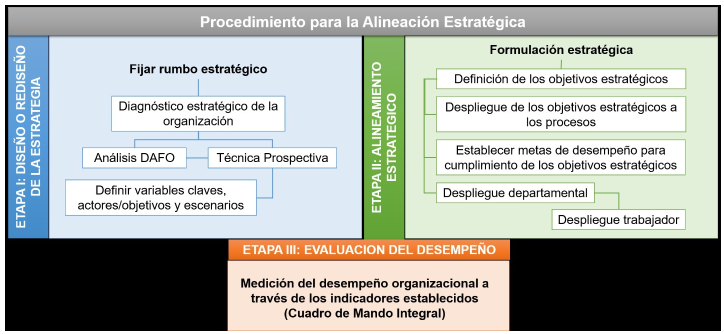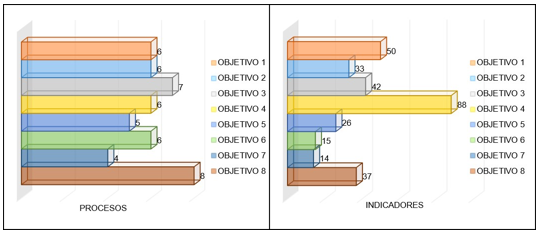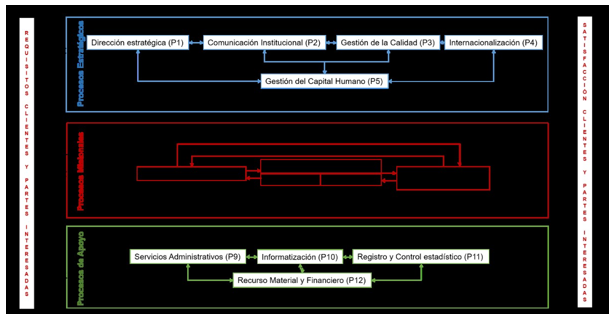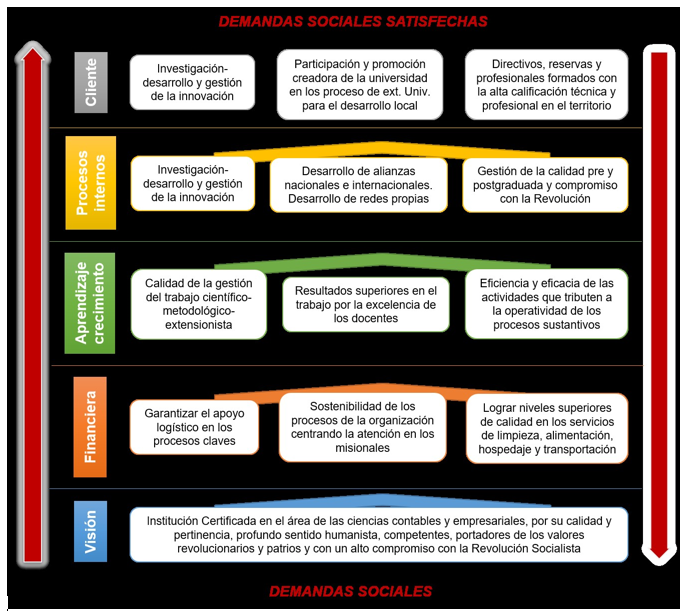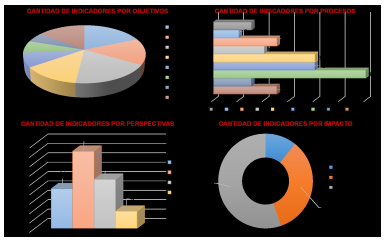Mi SciELO
Servicios Personalizados
Articulo
Indicadores
-
 Citado por SciELO
Citado por SciELO
Links relacionados
-
 Similares en
SciELO
Similares en
SciELO
Compartir
Mendive. Revista de Educación
versión On-line ISSN 1815-7696
Rev. Mendive vol.21 no.2 Pinar del Río abr.-jun. 2023 Epub 30-Jun-2023
Original article
Integration of administration focuses at the Faculty level at the University of Cienfuegos
1Universidad de Cienfuegos "Carlos Rafael Rodríguez". Cuba
The implementation of administration systems with strategic focus and guided to the quality and the integration of the processes, it constitutes a priority in the projections of work of the Ministry of Superior Education. The investigation had as objective improve system of administration of the Ability of Economic Sciences of the University of Cienfuegos starting from the application of procedures that allows to link the focus to processes and with the relative to the strategic address. Theoretical and empiric methods were used, including technical and tools of the Industrial Engineering and other specialties tune as: the analysis and the synthesis of the obtained information, inductive-deductive, the dynamics of groups, statistical methods and tools contained in such focuses as the strategic address and the focus to processes. The fundamental results of the obtained investigation are centered in: the strategic design of Ability of Economic Sciences, the adjustment of the process maps and strategic, the improvement of the technical records of administration indicators and the development of the proposal of a square of control integral for the studied Ability.
Key words: process approach; strategic direction; University management
Introduction
The research that is reflected in this article has as its starting point that, worldwide in the 21st century, Higher Education Institutions (HEIs) face challenges, focused, on greater relevance, on the results that these institutions provide. to society. The challenges have led these institutions to implement management approaches that contribute to increasing the quality of their actions.
The challenges are present due to the effect of a chain reaction and are caused by crises at the international level in all orders, which bring with them high complexity, dynamism and uncertainty in the environment, and originate the need to apply management approaches, that have been successfully implemented in the business context.
In recent times, various theories have been developed in the field of university management whose purpose is to achieve the sustainability and development of universities in the face of market globalization, the rise of technological innovation, information technology, among other conditioning factors that are considered as external challenges that HEIs must face worldwide.
After these significant changes, universities must be proactive and innovative in decisions that allow their survival and development, which is why they require an essentially strategic conception of management, which manifests itself in a systematic adaptation to the changing environment, with a shared vision of the desired future. of the organization (Galarza & Almuiñas (2018)).
The aforementioned authors raise some challenges that Cuban HEIs must face today, among which we can mention, for example: raising the quality of the comprehensive training of professionals; achieve a greater economic and social impact of the results of science and technology; promote the formation of values with the aim of guaranteeing the continuity and irreversibility of socialism, the economic development of the country and raising the standard of living of the population; prioritize the training of doctors to guarantee the sustainability of the faculty, strengthen the process of internationalization of Higher Education; develop actions that favor local and territorial development; and guide efforts towards the consolidation of quality management in Higher Education.
The HEIs are distinguished in their management by the dialectical relationship between their three substantive processes and by human nature, focused on the transmission of knowledge, the transformation of behaviors that make possible substantial changes in society, characterizing it as a system of complex processes. For this reason, the concept of university quality 1 entails relating the processes2, the pedagogical commitments and the ways of introducing them into the educational institution, in an orderly manner and with clear purposes, which helps to improve education and directly contributes to progress and the quality of life in a society (Ricaurte & Pozo, 2018).
Taking into account the aforementioned complexity, a new management concept emerges, called University Management 3 (Ricaurte & Pozo, 2018; Ortiz et al., 2019). In this regard, Galarza and Almuiñas (2018) affirm that: "none of the challenges that these institutions must face (...), will be achievable if University Management is not improved in parallel" (p. 2).
University Management is based on quality management, the process approach, strategic direction 4, risk management 5 and other approaches that have been tested and successfully integrated into the business context. For Galarza and Almuiñas (2018); Ortiz et al. (2019); Veliz (2020); González Aportela et al. (2020) and Vi et al. (2021), the aforementioned challenges that universities must face require an integrated, strategic and quality-oriented management to meet the demands of society.
Galarza & Almuiñas (2018) advocate the need to adopt a strategic approach in university management. From there, important and decisive relationships are derived between the strategic direction (visualized in the mission and purposes of the institution) and the quality management of university processes (management instruments). These relationships have extraordinary potential, still not sufficiently exploited in the university context.
It is worth noting a criterion issued by Galarza & Almuiñas (2018), authors who highlight a relevant issue for this research; and it is that for them in the strategic direction it requires tools (models, methodologies, techniques) that guide the way to achieve their objectives of this approach, which makes it possible to raise the possibility of linking it with other directions that reinforce it.
organic structures, a criterion that is shared with Chancay (2019). The fact of taking the modern University of the 21st century to work its academic organization and make it profitable in terms of fulfilling its mission, from the perspective of the process approach, brings a series of advantages in relation to the approaches previously assumed in these institutions. Ricaurte & Pozo (2018); Ortiz et al. (2019) and González Aportela et al. (2020).
The process approach focuses on establishing a guide that allows HEIs to implement a model to manage teaching, research, and outreach. To understand this vision, this management must be considered as a system whose main elements are the key and administrative processes, coordination, control of its operation and management of its improvement.
Cuban HEIs are involved in constant transformations to increase the efficiency and effectiveness of their management. The Ministry of Higher Education (MES) of Cuba, in its strategic planning for the 2017-2021 cycle, established areas of key results and measurement criteria that contributed to the implementation of the Sustainable Development Goals established in the 2030 agenda and the linkage of the University with all of society in a productive economic environment.
The University of Cienfuegos (UCf), as part of the management improvement since 2006, develops a new stage to undertake process management, as a way to improve the management of this institution. For more than a decade at UCf, research has been carried out that promotes the improvement of university management from various approaches, namely:
Research that provides important results is identified, specifically in the proposal of maps of processes and indicators at the level of faculties and universities; but these do not make any link with the strategic direction and are developed as part of the actions carried out in the first cycle. These investigations contributed to the identification of indicators, taking into account the management levels.
Research has been carried out in the area of strategic management. The fundamental characteristic of these investigations is that they analyze separately processes such as: strategic planning and strategic control, without carrying out a holistic analysis of strategic management; At the same time, it is not carried out with a focus on processes and quality management.
In the approach to processes, twelve-degree theses were developed that contributed at the faculty level.
In 2019, research made up of two master's theses is carried out, which makes a first attempt to integrate strategic management, the process approach and the internal control system.
In the same way, in the year mentioned above until the year 2021, research is carried out: four undergraduate theses and two master's theses, which initiate an approach to the necessary link between management and processes (philosophy worked in the institution, with significant advances) and risk management, at the university, faculty and process level, respectively.
In the same year, as a result of a doctoral thesis, a model for the control of the strategy is designed and partially implemented, which contributes to the improvement of strategic direction and university management at UCf. Another result obtained in the investigation was related to the design of the strategic control system of the University of Cienfuegos (SISCE-UCf), which integrates elements of strategic management, the approach to processes and the internal control system, remaining among the recommendations from this research the design of a balanced scorecard.
The investigations developed since 2017 led to the design of a management system for the institution with an integrated strategic approach, having as its central axis the management of university processes, integrating the strategic direction and the Internal Control System, on which it was focused. the management of the UCf until 2019, as part of the maturity of the management system designed. It is worth noting that in this approach assumed in the institution, the key result areas were suppressed and measurement criteria were maintained.
At present, it is necessary to develop an adaptation taking into account the need to include a new structure in the project, based on establishing strategies, objectives and processes that respond to these, as well as the establishment of indicators with their corresponding goals from of the new indications issued by the MES, based on the Strategic Project for the year 2020 prepared by this instance. In turn, it is necessary to design a comprehensive scorecard, an issue that had been pending from the aforementioned investigations; the indications of the MES favor the conception of this management tool.
Specifically in the faculties as organizational units of the HEIs, the aforementioned is also evident and the development of these standards is required as a fundamental principle for the effective development of the management system that in turn pays taxes to the one developed in the UCf. In correspondence with the above, the Faculty of Economic Sciences (FCE) has decided to undertake an improvement of its university management system. It is an objective that has been developed throughout the 2017-2021 strategic cycle. Therefore, the objective of the research is focused on: improving the FCE management system by establishing an integration between the process approach and strategic management.
Materials and methods
The type of research that was developed is non-experimental and of a longitudinal nature (Hernández, 2010), because the behavior of the development of the strategic approach and its link with the process approach during a strategic cycle are analyzed. It went through the following types of research: exploratory, because it was intended to learn about the application of the aforementioned approaches in the university environment; descriptive, since the behavior of these approaches and the level of integration of these in the universities and in the UCf are measured independently; correlational, because the behavior of these approaches was known by developing a link between them.
Several theoretical methods were used, among them: the historical-logical, in the analysis of the historical evolution of the approaches in university management, specifically, the strategic direction and the approach to processes; the analytical-synthetic and the inductive-deductive, in the elaboration of the theoretical-conceptual foundations of the object of study, the processing of information, the evaluation of the results of the diagnosis and the design of the proposal.
As empirical methods are used: the analysis of documents, which allowed to examine and reach conclusions on the elements of a theoretical, methodological and practical nature related to the investigated problem. participant observation made it possible to identify the interrelation with the management approaches that are intended to be linked, in addition to the active participation of the authors in all stages of the development of the research, by being part of the work team formed for such purposes. Together with the aforementioned methods, a group participation workshop was developed, a group interview that allowed to know the current situation of the object of study and the validation of the information represented in process diagrams, the description of these and the proposals developed in the investigation.
The statistical methods that were used are based on descriptive statistics to process the information obtained. In turn, the percentage calculation and the pie chart were used to analyze the current behavior of the management system and its comparison with the proposal made.
Results
In the bibliographic search on this topic, three Cuban universities are identified that are committed to an integrated management of their systems, responding to the requirements of various interested parties, namely: University of Havana, Central University of Las Villas and the University of Holguín. This integration considers the management of its substantive processes as the basis of university management, strategic planning and the conception of the internal control system.
Based on the challenges established for the Cuban HEIs, the strategic plan of the University of Cienfuegos, for its part, has a set of work objectives dedicated to the topic related to process management and its link with the strategic direction and the internal control.
Specifically, the strategic plans dedicated to the 2013-2016 and 2017-2021 cycles are carried out with a process approach, based on the priorities established by the MES and the results of the institution's diagnosis.
As part of the improvement of management, since 2015 at the University of Cienfuegos a new stage has been developed to undertake process management as a way to achieve the established purposes.
At the UCf, research has been carried out on issues related to strategic management and based on the development of the process approach at the UCf level and in the Faculties of Economic and Business Sciences (FCE), in the Faculty of Social Sciences (FCS).
Investigations that provide important results are identified, specifically in the proposal of process maps and indicators at the level of faculties and universities, in the area of strategic management, focus on processes, improvement of the UCf management system, control of the strategy in the institution. A procedure has been developed at the level of the University, faculties and processes that allows the integration of the approach to processes and internal control. These investigations demonstrate the progress that university management has had at the University of Cienfuegos, since there are experiences regarding the integration of strategic management, the process approach and internal control in all stages of the management system, remaining the need to design an Integral Mantle Chart (CMI) is still pending, with an approach that allows integration.
Based on the experience available at the UCf, it is necessary to implement a procedure that allows adjustments to be made to the strategic project of FCE and that at the same time promotes the measurement of results in a CMI for decision-making and evaluation. of the performance of university processes.
In this research, a procedure is designed based on the steps provided by Ortiz et al. (2019). The proposed structure of steps is organized in three stages (figure 1).
The first two stages were developed in three investigations (preceding the current one) developed at the FCE. In the first one, the 2017-2021 Strategic Planning is designed and the second takes this design as reference and proceeds to the strategic alignment. The current investigation corresponds to the fulfillment of the third stage related to performance evaluation, focused on the design of the Balanced Scorecard.
Need for adjustments in the strategic design of the FCE
It is valid to detail that the research gave rise to the need to make adjustments in the strategic design of the year 2020 at the University level and its dependencies, to then proceed to design the CMI of the FCE, due to the fact that until 2019 work was being done. with the strategic design 2017-2021; however, at the end of 2019 indications are received to project the year 2020 taking into account:
7th Congress of the PCC and ANPP:
Agenda 2030 and the Sustainable Development Goals.
Main problems that affect the fulfillment of the mission of the ministry.
Indications of the president:
5- Indications of the minister to integrate the above
In the indications issued by the MES for the year 2020, a new approach is projected, which is structured as shown in figure 2.
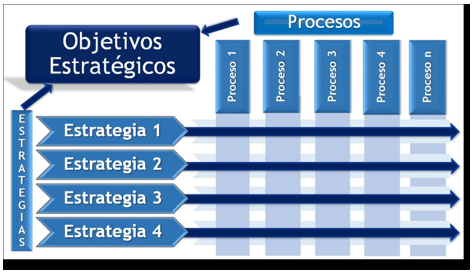 Source: Strategic Project of the MES, 2019
Source: Strategic Project of the MES, 2019Fig. 2 - Approach of the Strategic Project for the year 2020 of the MES and affiliated institutions
The previous approach, indicated by the MES, was supported by Key Result Areas (KRAs), objectives and measurement criteria. Similarly, the possibility that each institution could make adjustments to its design was established. The UCf and its dependencies chose to include the process approach in their design, an integrated approach that they developed during the first three years of the 2017-2021 cycle. A comparison of both forms of management (until 2019 and from 2020) is shown in figure 3.
For this reason, we proceed in this investigation to make adjustments in vital aspects of the strategic design, the execution of actions and for the CMI, such as:
Design of the Strategic Project for the year 2020.
Review of the Process Map.
Map Review _ strategic.
Next, we proceed to show the results of the adjustments of the Strategic Project of the Faculty of Economic and Business Sciences for the year 2020. For the development of these adjustments, the application of techniques was used, such as:
Review and analysis of documents.
Meetings participatory.
Job in group.
Consult experts, considering the members of the University Management Research Group of the University of Cienfuegos and members of the Board of Directors of the FCE.
Design of the Strategic Project for the year 2020
Taking into account the indications of the MES, the strategic design for the year 2020 is prepared, based on aspects such as: strategies, strategic objectives, processes and indicators. Figure 4 shows a summary of the number of processes and indicators by strategic objectives established in the FCE in the new strategic design.
Review of the Process Map
Until 2019, the faculty has the Map of Processes. By indications of the MES, it is necessary to include Internationalization within the classification of strategic processes and in support processes Material and Financial Resources, as shown in figure 5.
Strategic Map Review
For the preparation of the Strategic Map, the cause-effect relationship maintained by the strategic objectives established among themselves and their correspondence is defined. At FCE, the design of the Strategic Map was focused on four perspectives (technology, learning and growth, internal processes and the client). As of 2020, the strategic map undergoes modifications in accordance with the new requirements of the MES, where the financial perspective is incorporated, as shown in figure 6.
Once the necessary adjustments have been made, we proceed to show the steps for the design of the Balanced Scorecard for an HEI.
Procedure for the design of the Balanced Scorecard for an HEI
For the development of this stage, the steps proposed by Ortiz et al. (2019), shown in figure 7.
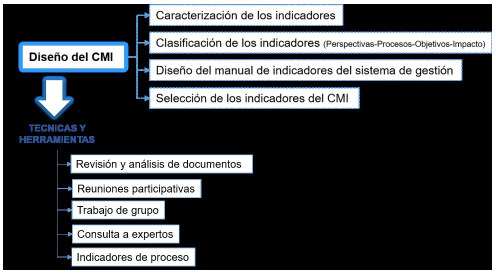 Source:Ortiz et al. (2019)
Source:Ortiz et al. (2019)
Fig. 7 - Steps for the design of the CMI of the procedure of Ortiz Pérez, Pérez Campaña & Velázquez Zaldívar (2014)
The FCE has a process manual based on the preparation of SIPOC diagrams, flowcharts, process sheets and indicator technical sheets, results of six investigations that precede the current one. This manual of processes constitutes a consultation tool for the directors and specialists of the faculty; Through all this information, it is possible to visualize, with a greater number of details, the inputs of the processes, as well as the interrelationships, regulations, internal and external clients.
As a result of the aforementioned documentation, there are indicators that are in charge of specifying the behavior of the processes in measurable expressions, in such a way that they allow their quantitative translation and the establishment of comparative states. It is necessary to clarify that, for the year 2020, as part of the adaptations (already exposed previously), there is a group of indicators that were incorporated, since they were not among those provided in the previous projections.
Taking into account the adjusted strategic map, we proceed to classify the indicators by perspectives, processes, objectives and impacts. A summary of this can be found in figure 8.
For the selection of the most representative indicators, the indication of the MES was taken into account, which establishes a group of indicators that are essential, which contribute to the Sustainable Development Goals. Of these, those applicable to the UCf and, in turn, to the FCE are identified. As a result of these steps, the Comprehensive Scorecard of the FCE is elaborated, which has the characteristics shown in figure 8.
Discussion
Following the criteria of various authors consulted in the framework of the research, the strategic direction has gradually become a model of positive change, which directs the university from a real state to one that is desired and feasible to achieve (Galarza & Almuiñas (2018); Ortiz et al., 2019). For the authors of this paper, it is important to highlight that the characteristics that distinguish strategic management give the process-directed approach a strategic orientation, which it lacks. It is a criterion that is relevant in this research that by integrating these approaches, university management gains strength, since the existing deficiencies in each of these are complemented, which is verified in the results shown previously.
In turn, in the development of the research, research that has developed studies on the process approach and its link with strategic direction in HEIs is consulted. All recognize the relevance of the link between these approaches, for the management of these institutions. In this regard, Ortiz et al., (2019); González Aportela et al. (2020); Ricardo et al. (2019); Veliz et al. (2020) recognize this link as an essential element towards and for competitiveness. For this reason, the proposals developed in this research establish the bases for efficient 6, effective 7 and effective 8 management, by using two procedures accompanied by management techniques and tools contextualized to the university environment, which will help the institution studied to face the challenges demanded by society, in a proactive manner and with results that contribute to a management framed in the field of university quality. This last term that can be worked from the point of view of integrated management systems, when a link is established between the management approaches linked in this research and others (risk, environmental, energy management), which constitutes another of the challenges that HEIs must face, and a topic not addressed in the research results presented in this publication.
In the theoretical analysis and in the field, work carried out in this research, twelve common aspects are identified between the strategic management approaches and the process approach. These points make the integration of these approaches viable and allow the design of a university management system that links them:
They are processes, not facts or isolated circumstances, they have a cyclical, preventive and prospective nature, feasible to apply the approach to processes.
Establish mechanisms to verify compliance with institutional objectives and satisfaction of society.
Use of indicators common to the two approaches that allow measuring performance of the processes through which they go through and of these in themselves.
They have an implicit cycle of planning, doing, checking and acting; They are considered as management approaches, which allow the development of an internal evaluation and consequently achieve the commitment to continuous improvement.
They are led by the management team.
They affect the rest of the processes of the organization.
They constantly seek continuous improvement.
They ensure the fulfillment of goals with quality, efficiency and effectiveness.
They affect the formation of human capital, the organic structure and, therefore, the organizational culture
Satisfaction of society as a whole.
As a whole, they help to comply with evaluation and accreditation strategies, train and create the conditions to face external evaluations.
They generate common documented information considered, as evidence before performance audits and quality assessments.
The research presented in this article has a practical value, which is associated with the improvement and development of the management system with a process approach in the organization under study, by reorganizing activities and resources, delimiting the responsibilities of the actors involved in its management, strengthen the coordination and normalization mechanisms as a contribution to the organizational discipline of the HEI and the state of control to increase the fulfillment of the objectives with efficiency and effectiveness.
In the same way, it has a social value of research that is manifested in the improvement of the work environment as a result of organizational changes that are close to the best management practices, with the increase in the satisfaction of the members of the university community and the society with the performance of the processes.
After having carried out this investigation, and as a result, the following general conclusions are reached:
The challenges faced by HEIs in the 21st century is focused on the responses that these institutions must issue towards society to resolve crises in various areas and on a look inside these, which must be efficient, effective and effective organizations. What has been proposed has imminently caused transformations in university management.
The trends to face these challenges point to the search for an integrated approach in university management, having strategic management as an integrating philosophy, which due to its characteristics allows establishing links with the process approach. With respect to the integration of these approaches, the authors consulted agree in stating the need to make contributions at the theoretical and procedural level.
Research has been carried out internationally, nationally and within the institution itself that aim to improve university management with an integrated approach. The bibliographic analysis made it possible to select the procedure that was conceived and applied in the studied institution itself, having to develop an adaptation in the last of the stages, focused on the inclusion of steps that allow the design of a selected BSC in the analysis of the state of the practice, an issue that constitutes a contribution of the present investigation.
Taking into account the indications of the MES, and as part of the application of the selected procedure, vital results are obtained in university management at the faculty level, focused on: the elaboration of the strategic project for the year 2020, the readjustment of the strategic maps and processes, the documentation of the indicators that support the measurement of the performance of the processes from the preparation of technical files and the design of the CMI that has the essential indicators applicable to the FCE and allow measuring the level in which the faculty gives response to the demands of the environment.
Referencias bibliográficas
Chancay Mora, M., & Murillo Mora, M. (2019). Gestión basada en procesos en Universidades públicas. Revista Caribeña de Ciencias Sociales. https://www.eumed.net/rev/caribe/2019/04/procesos-universidades-publicas.html [ Links ]
Galarza López, J., & Almuiñas Rivero, J. L. (2018). La gestión de la calidad y el enfoque estratégico de la gestión. Un vínculo inseparable para interpretar la universidad actual. Revista Estrategia y Gestión Universitaria, 6(1), Pág. 143-154. [ Links ]
González Aportela, O., Batista Mainegra, A., & González Fernández Larrea, M. (2020). Sistema de gestión de la calidad del proceso de extensión universitaria, una experiencia en la Universidad de La Habana. Revista Electrónica Calidad en la Educación Superior, 11(2), 105- 134. https://www.researchgate.net/publication/347293274_Sistema_de_gestion_de_la_calidad_del_proceso_de_extension_universitaria_una _experiencia_en_la_Universidad_de_La_Habana [ Links ]
Hernández Sampieri, R, Fernández Collado, C, & Baptista Lucio, P. (2010). Metodología de la Investigación. México D.F, México: Mc Graw Hill Interamericana, Editores S.A de C.V. [ Links ]
Ortiz Pérez, A., Pérez Campaña, M., & Velázquez Zaldívar, R. (2019). Gestión universitaria con enfoque a procesos. Revista de Investigación Latinoamericana en Competitividad Organizacional, 3. https://www.eumed.net/rev/rilco/03/gestion-universitaria.htm [ Links ]
Ricardo Herrera, L., Velázquez Zaldívar, R., & Pérez Campaña, M. (2019). El enfoque de procesos en la gestión económica financiera de las universidades. Aplicación en la Universidad de Holguín. Estrategia y Gestión Universitaria, 7(1), 18-41. https://revistas.unica.cu/index.php/regu/article/view/1263 [ Links ]
Ricaurte Yépez, C., & Pozo Rodríguez, J. M. (2018). Gestión, Procesos y Calidad Universitaria: Caso Ecuatoriano. European Scientific Journal, ESJ, 14(34), 195. https://doi.org/10.19044/esj.2018.v14n34p195 [ Links ]
Veliz, B. V.F., Alonso, B. A., Alfonso, R. D., Fleitas, T. S., Michelena, F.E. (2020). Procedimiento de gestión para asegurar la calidad de una universidad. Caso de estudio Universidad Técnica de Manabí. Ingeniare. Revista chilena de ingeniería, 28(1), 143-154. https://www.researchgate.net/publication/341038300_Procedimiento_de_gestion_para_asegurar_la_calidad_de_una_universidad_Caso _de_estudio_Universidad_Tecnica_de_Manabi [ Links ]
Vi Tran, A., Nguyen Thi, M., Ho Thi, T., & Truong Cong, D. (2021). ISO Standard Application in University Management Model: A Case Study. International Journal of Information and Education Technology, 11(4). http://www.ijiet.org/vol11/1511-T015.pdf [ Links ]
6Eficiente: el cumplimiento de los objetivos con racionalidad en el uso de los recursos (Ortiz et al., 2019).
7Eficaz: satisfacción de las demandas de la sociedad (Ortiz et al., 2019).
8Efectiva: involucra la eficiencia y la eficacia, es decir, el logro de los resultados programados con calidad, en el tiempo propuesto y con los costos más razonables posibles (Chancay, 2019).
1Calidad universitaria: una construcción social, colectiva y cambiante de acuerdo con los objetivos y valores de la organización educativa y al entorno político, económico, ambiental y sociocultural vigente, que permite ser utilizada como herramienta de gestión, pues lleva consigo la mejora continua de la organización en todos los niveles, a partir de la participación y compromiso activo de sus actores y teniendo como fin el cumplimiento del encargo institucional y la satisfacción de la sociedad (González Aportela et al., 2020).
2Procesos universitarios: se considera la interrelación que se produce entre los diferentes procesos estratégicos, sustantivos y de apoyo que se desarrollan en las universidades, que conforman una unidad orgánica, pues todos ellos están fuertemente ligados a la posibilidad de contribuir ostensiblemente al cumplimiento de los objetivos institucionales (Ortiz et al., 2019).
3La gestión universitaria como el proceso de planificación, organización, implementación, control y mejora de los procesos universitarios de forma integrada, para incrementar su calidad, en la búsqueda de la excelencia y la satisfacción de las demandas de la sociedad (eficacia), a través de una mayor efectividad en la toma de decisiones y racionalidad en el uso de los recursos (eficiencia) (Ortiz et al., 2019).
4Dirección Estratégica: un proceso iterativo y holístico para la formulación, implantación y control de la estrategia institucional, que garantiza una interacción proactiva de las universidades con su entorno, para coadyuvar a la eficiencia y eficacia de los resultados en el cumplimiento (Almuiñas & Galarza, 2018).
Received: November 07, 2022; Accepted: January 31, 2023











 texto en
texto en 

